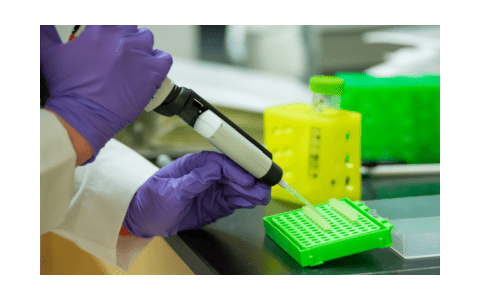“The P&F program has had a long and successful record of achievement in supporting the career development of diabetes investigators,” said the program's director Jeffrey Elmendorf, PhD. “As we continue, we look forward to working with current and future applicants to help foster the development of their new programs.”
Elmendorf said the award program is a worthwhile investment and plays a crucial role in initiating high-risk projects in unexplored areas related to diabetes and metabolic disease, which holds significant importance for public health.
Since its inception in 2015, the CDMD P&F program has awarded more than $1.8 million to 42 scientists statewide. Past awardees represent IU School of Medicine, IU Bloomington, IU-Terre Haute, IU-Fort Wayne, IUPUI School of Science, the Indiana Biosciences Research Institute and Purdue University.
The program boasts a historically successful return on investment. To date, awardees have secured over $20 million in additional funding from the National Institutes of Health—including 24 independent research awards (R awards)—and private foundations following their CDMD P&F awards.
Elmendorf believes the 2023 P&F awardees, all representing IU School of Medicine, have exciting projects under development. “These projects range from understanding how bacterial imbalance in the gut may increase type 1 diabetes risk to how newly identified cellular changes may drive various diabetic-related complications such as kidney disease, liver abnormalities, bone fragility, and infection severity,” he said. “Two other projects aim to fine-tune pancreatic beta cell function and to identify motivation signals that are hypothesized to contribute to poor lifestyle choices associated with diabetes development.”
2023 Awardees
 Heba Ismail, PhD
Heba Ismail, PhD
Assistant Professor of Pediatrics, IU School of Medicine
Project title: The gut microbiome in children with type 1 diabetes with obesity and novel mechanism of action of metformin
Project summary: Evidence suggests that type 1 diabetes (T1D) risk and progression are associated with gut bacterial imbalance. Gut microbiome differences are also associated with, and thought to contribute, to obesity. Ismail's data support the presence of differences in the microbiome in these two groups. In this project, differences in the gut microbiome composition in T1D youth who are lean vs. obese will be determined. In addition, the effects of metformin on the gut microbiome in obese children with T1D will be accessed to identify novel treatments to improve disease management.
 Danielle Janosevic, DO
Danielle Janosevic, DO
Assistant Professor of Medicine, Division of Nephrology, IU School of Medicine
Project title: Kidney sphingolipid composition in diabetic mice predispose to sepsis-associated acute kidney injury
Project summary: Diabetes is an independent risk factor for sepsis-associated acute kidney injury (sAKI). Using untargeted spatial metabolomics and single cell RNA sequencing, Janosevic revealed that bioactive sphingolipids were functionally and transcriptomically dysregulated at all timepoints spanning baseline and sAKI, in a cell-type specific manner in diabetic mice compared to non-diabetic littermate controls. This project will test the hypothesis that altered sphingolipid metabolism leads to cellular dysfunction that predisposes diabetics to, and maladaptive recovery from, sAKI.
 Hyeong-Geug Kim, PhD
Hyeong-Geug Kim, PhD
Research Assistant Professor of Biochemistry and Molecular Biology, IU School of Medicine
Project title: Protective effects of hepatocyte ATG14 against inflammasome driven pyroposis
Project summary: Liver function is critically impacted by diabetes. Kim’s data support a model by which autophagy, an essential process for liver health, may be compromised in the setting of nutrient excess and diabetes. A key autophagy related gene, Atg14, regulates the initiation of autophagy. However, a liver-specific function of Atg14 in liver cell (hepatocyte) death and liver injury are not known. To study, Kim generated a hepatocyte-specific Atg14 knockout mouse and found pyroptosis, a cell-death pathway, was significantly altered. This project will test if Atg14 plays a role in the protection against diet-induced liver injury by prevention of hepatocyte death.
 Yukiko Kitase, PhD
Yukiko Kitase, PhD
Research Assistant Professor of Anatomy, Cell Biology and Physiology, IU School of Medicine
Project title: The impact of high-fat diet on osteocyte energy metabolism and function
Project summary: Obesity is a major risk factor for developing bone fractures. Kitase identified that high fat feeding mice significantly decreased bone strength as a result of osteocyte bone cell metabolic dysregulation. Studies further identified a key transcription factor (PPARδ), an essential mediator of fatty acid synthesis, storage and oxidation, contributes to diet-induced bone fragility. Using osteocyte selective PPARδ knockout mice this project will test the hypothesis that PPARδ mediates high-fat feeding induced pathological osteolytic osteolysis leading to reduced bone strength.
 Yao-Ying Ma, MD, PhD
Yao-Ying Ma, MD, PhD
Assistant Professor of Pharmacology and Toxicology, IU School of Medicine
Project title: Exploitation of neural strategies to regulate motivation for diabetes self-management
Project summary: Insufficient lifestyle modifications can accelerate the onset of type 2 diabetes (T2D). From a neurobiologist perspective, Ma’s research is focused on neuronal activities in the brain that regulate self-management, particularly those areas critical for decision making, motivation status, and behavioral flexibility. This project is designed to identify potential neural/synaptic substrates regulating self-management in a prediabetic mouse model to test the hypothesis that hypoactivity in the medial prefrontal cortex and increased Ca2+ permeable-AMPA receptors in the nucleus accumbens underlie deficient self-management during T2D development.
 Jason Spaeth, PhD
Jason Spaeth, PhD
Assistant Professor of Pediatrics, IU School of Medicine
Project title: Chd4 controls endocrine progenitor cell fate in vivo
Project summary: A key research objective of Spaeth’s group is to use existing knowledge of how pancreas enriched transcription factors (TFs) coordinate signals that direct islet cell development to understand how such programs can be targeted for β-cell replacement therapies. Pdx1, one of the most important TFs in the pancreas and developing islet, has been shown to recruit a diverse set of coregulators which could potentially modulate its activity. This proposal is focused around how the Pdx1 recruited Chd4 subunit of the Nucleosome Remodeling and Deacetylase complex modulates endocrine cell development and postnatal islet cell function.
 Jay Vornhagen, PhD
Jay Vornhagen, PhD
Assistant Professor of Microbiology and Immunology, IU School of Medicine
Project title: Assessing the role of type 2 diabetes in klebsiella pneumoniae pathogenesis
Project summary: The bacteria Klebsiella pneumoniae is an important cause of hospital-acquired and antibiotic-resistant infections, including pneumonia, bacteremia, and urinary tract infection. These infections are increasingly associated with diabetes mellitus, yet poorly understood. Using well-established mouse models of K. pneumoniae colonization and infection, this project will investigate the role of type 2 diabetes (T2D) in K. pneumoniae colonization and infection. A key expectation, supported by preliminary data is that T2D enhances K. pneumoniae colonization and infection severity that will permit important future mechanistic investigation.
